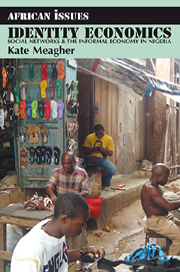Book contents
- Frontmatter
- Contents
- List of Figures & Tables
- Acknowledgements
- Abbreviations
- 1 Introduction
- 2 Beyond the Cultural Turn
- 3 Oracles, Secrets Societies & Hometown Identities
- 4 Unleashing Popular Entrepreneurship
- 5 The Scramble for Weak Ties
- 6 Negotiating the Web of Associational Life
- 7 Collective Efficiency or Cutthroat Cooperation?
- 8 Informality, Cliental Networks & Vigilantes
- 9 Missing Link or Missed Opportunity?
- Epilogue
- Appendices
- Bibliography
- Index
9 - Missing Link or Missed Opportunity?
Social Networks & Economic Development in Africa
Published online by Cambridge University Press: 05 April 2013
- Frontmatter
- Contents
- List of Figures & Tables
- Acknowledgements
- Abbreviations
- 1 Introduction
- 2 Beyond the Cultural Turn
- 3 Oracles, Secrets Societies & Hometown Identities
- 4 Unleashing Popular Entrepreneurship
- 5 The Scramble for Weak Ties
- 6 Negotiating the Web of Associational Life
- 7 Collective Efficiency or Cutthroat Cooperation?
- 8 Informality, Cliental Networks & Vigilantes
- 9 Missing Link or Missed Opportunity?
- Epilogue
- Appendices
- Bibliography
- Index
Summary
Introduction
In the Aba shoe and garment clusters, things have never quite been the same since the time of the Bakassi Boys. The problem is not just the disorder triggered by vigilante violence, but the mounting costs of intense Asian competition and ongoing institutional neglect, undermining any possibility of a competitive response. The disruptive turn of the Bakassi Boys coincided with the liberalization of shoe imports in Nigeria. Cheap ‘Dubai’ shoes (made in China and imported via the freeport of Dubai) flooded the Nigerian market from mid-2000, making the 2000/2001 production season the worst in years. Succeeding years have seen an ongoing collapse in demand for Aba shoes, ensuring a ready supply of frustrated young men for recruitment into vigilante activities. Cheap Asian garments have also continued to threaten the survival of the garment cluster. In 2000, considering the possibility of lobbying the government against trade liberalization, the President of Aba Garment inquired into the kinds of state assistance that Indonesian and Chinese small enterprises received. Upon hearing of the infrastructure, technical and financial support, and export assistance provided for Asian small producers, he replied in exasperation ‘And we who receive nothing from our government, how are we to compete?’ The imposition of a ban on imported textiles in 2002 (though only really put into effect in 2004) eased the pressure on garment producers a little, but it has also created new problems of access to fabric inputs needed for garment production.
- Type
- Chapter
- Information
- Identity EconomicsSocial Networks and the Informal Economy in Nigeria, pp. 164 - 178Publisher: Boydell & BrewerPrint publication year: 2010

